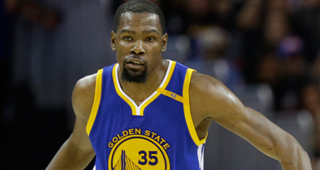Kevin Durant has been outed. The former MVP and recent NBA champion with the Golden State Warriors got caught with an overzealous Twitter hand, defending himself against accusations of treachery against his ex-team, the Oklahoma City Thunder. “he didn’t like the organization or playing for Billy Donovan. His roster wasn’t that good, it was just him and russ,” Durant tweeted from his official account. “imagine taking russ off that team, see how bad they were. Kd can’t win a championship with those cats.”
It stands to reason that Durant meant to send these tweets to @ColeCashwell from an alternate account, from which he impersonates a normie as he defends his own honor, versus tweeting about himself in the third person and swiftly deleting it. As full of himself as Durant has a right to be after his outstanding season—and with many more to come as the Warriors dynasty hits the runway—he has yet to see it fit to speak of himself with the same reverential detachment as someone like Anthony Scaramucci. It is, in other words, more plausible that the 2017 Finals MVP uses puppet accounts to defend himself than it is that he showed too much of his ego on accident.
Durant’s slip is actually quite the opposite of egotistical: it reveals his capacity to be hurt. He is upset enough by his milquetoast skeptics that he places himself in discourse with anonymous haters like @codycashwell1244 (@ColeCashwell’s brother?!); “You’re still a bitch though [crying emoji],” the user with 674 followers, a topless avatar in a pool, and a Chicagoland area code tweets at arguably the best basketball player in the whole world, because Durant tweeted at him first. Despite his ascendancy to the throne, KD is clearly unsatisfied enough by the notion of people being wrong about him on the internet that he pretends to be other people (who are *right* about him on the internet) to combat them.
This latest episode is hardly a deviation for Durant, who is frequently mad online. He has often been seen using his own account to more directly confront his critics in the months following his crowning moment. “I feel positive about myself when I respond to ‘negative shit’ lol,” Durant tweeted earlier this month. This was a day after he noticed a question posed by a Barstool Sports blogger on Twitter, “What is softer? @KDTrey5 or @TexasFootball?” and replied “your mother.” When the blogger then suggested that Durant was “in [his] feelings,” Durant went on to retort: “you can throw jokes and it's fun but when I do it I'm in my feelings? It don't work like that bro. U don't have that much power.”
There are few things more obviously embarrassing, on the internet, than getting caught trying to defend yourself while wearing the mask of an earnest fan. But Durant’s more traceable forms of social media meddling—who knows how many stans of his he may be mimicking? he could even be me…—are a transformative continuation of his career-long ability to convert pathos into power. This is the player made iconic for wearing a backpack like an adolescent during a playoff podium appearance, for sitting glum on his butt during pivotal post-season free-throws, appearing crippled by his nerves. When he attempted to rebrand as “not nice” in a Nike campaign a half-decade ago, the ads elicited more laughter than intimidation. Durant has always been messier and more human, more approachable, than he’s been a Mambaesque totem of masculinity.
Durant’s social media reclamation efforts, in which he strives to seize the means of NBA perception-making, make for a rare transparency of emotion. It is common knowledge, amongst those familiar with the human condition, that NBA players care what fans and media members think. It is not precisely “like a boss” to care about opinions put forth by people with less money, physical size, and platform than you, however, so most players will never fess to it. Kevin Durant, sometimes sloppily and sometimes accidentally, does. And so while the hardly precedented balance of power and elegance in his playing style is undeniably what creates most of his appeal, this sort of readiness with which Durant bears his sensitivity has endeared him to the public, too.
Such reflexive biting back toward fans, from the best player on what is perhaps the most stacked team in league history, though, can of course easily be read as sour and salty grapes, shed by the spoiled. What room does Durant have to be unsatisfied? The Warriors are going to monopolize the league’s titles, and we’re supposed to like it, too? Well, no. You’re still allowed to doubt, to be a hater, to use whatever words you want to abuse this exceptional athlete’s legacy. Just know that if you cut into Durant, he’s a player unusually willing to cut you back. Though the record shows that, sometimes, you might win actually win your exchange with him; even @ColeCashwell (who has 104 followers and is apparently 16 years old) can strike hot enough upon KD’s exposed bone to make him misfire his internet messages. In the Era Of Receipts, the ledger will show Durant—a feeler of feelings: ultimately dope and a net-positive, to be sure—with consistently extra humanity.



